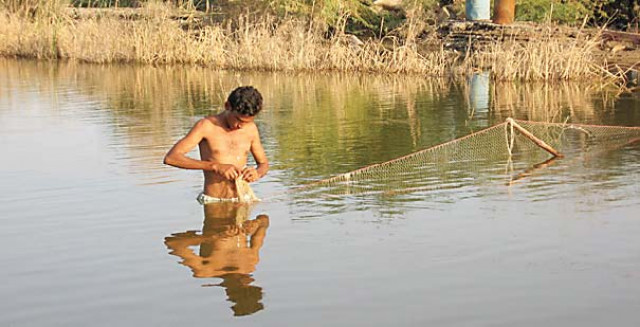Got no rice? Eat fish
With thousands of acres of farm land under water, many farmers have turned to fishing to feed their families.

Got no rice? Eat fish
“The floodwaters destroyed our houses and livelihoods, but brought us lots of fish so we wouldn’t die of starvation.”
Sohbatpur is one of the four sub-divisions of Jafarabad district that were submerged on August 14. According to official figures, it has an approximate population of 800,000 people. Of the 46 union councils in the district, 41 are still under six-foot-deep water, pushing people out of their homes.
Unlike the flood-affected people from Rojhan Jamali, Jhat Pat and partially-submerged Dera Allah Yar who moved to higher grounds and safer areas such as Dera Murad Jamali, Sibi and Quetta, residents of Sohbatpur chose to camp along the main Sohbatpur road, near their towns and villages.
Aid is slow to reach here. “Although we have tents, food is a problem. My family has been living on fish for over a month,” says Ali Gul of Adampur goth in Sohbatpur. “This too will also go away once the waters start to recede,” he fears.
NGO-army collaboration
The army is collaboration with the Balochistan Rural Support Programme (BRSP), the sole national NGO that is able to reach out to people in the remote areas of the province.
This work has helped bridge the trust deficit to a certain extent. “Initially, when the army set up camps, people refused to stay in them,” BRSP’s manager social sector Anwar Panezai tells The Express Tribune. “A woman actually said she’d prefer to sleep under the open sky as her relatives would kill her if they found out that she was staying in the army camp.” But by coordinating with the BRSP, the army was able to reach out to people who were initially reluctant to accept its help.
This partnership has also benefited the BRSP as Balochistan’s challenging terrain is difficult for relief organisations to understand. This is where the army can play a positive role. “We are familiar with the area,” says an army official requesting anonymity.
‘Can’t return before a year’
The Balochistan government, meanwhile, is conspicuously absent. However, it is eager for people to move back to their homes and official trucks are parked outside most camps, pushing the IDPs to return in a bid to start the rehabilitation phase. “There is no money in the rescue phase for the government to pocket,” alleges Panezai. “But the rehabilitation phase promises money for houses, schools, hospitals and roads. How much of this will actually be spent on people and how much on paper, we are yet to see.” The IDPs have, however, refused to accept the ‘free ride’ home as their houses are still under water. “What are these trucks doing here? How can we go back? My house is still under water,” says Inayatullah, an IDP at Mangoli camp in Dera Allah Yar and a resident of Usta Mohammad, one of the several submerged sub-divisions of Jafarabad.
“Even if my house is rebuilt, I’ll have no livelihood,” Inayatullah says. “They’ve been saying it’s a temporary camp, but life here seems pretty much permanent at this point. I don’t think we can return before a year.”
Published in The Express Tribune, October 2nd, 2010.



















COMMENTS
Comments are moderated and generally will be posted if they are on-topic and not abusive.
For more information, please see our Comments FAQ